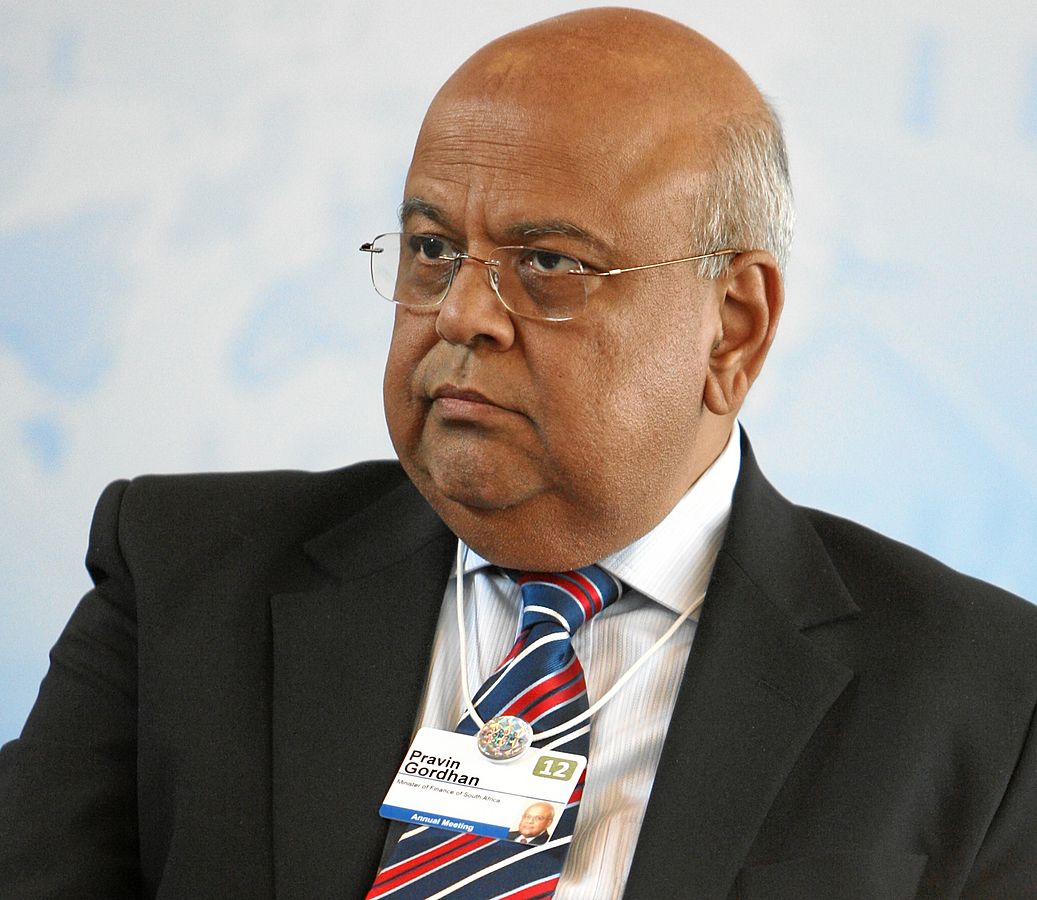
Pravin Gordhan's budget had to straddle the demands of both unions and credit rating agencies. It is not yet clear if either will be satisfied. Photo by Sebastian Derungs via Wikipedia. Copyright: World Economic Forum/swiss-image.ch (CC BY-SA 2.0).
28 February 2016
The Budget has come and gone — and has done little or nothing to assuage the anger felt in many sections of the embattled trade union movement. If anything, it has given added impetus to a move by those unions set to convene a “workers’ summit” to seek new directions both for the labour movement and the country.
But even within the governing, ANC-led alliance — and despite murmurs of broad support — there are signs that finance minister Pravin Gordhan’s attempts to straddle the demands of the rating agencies and the unions have not pacified alliance partners Cosatu and the South African Communist Party (SACP). And, on Friday last week, there were two pre-Budget gatherings that gave a foretaste of ongoing tensions on the labour front.
In the first place, the SACP leadership, headed by general secretary Blade Nzimande, staged a “bilateral meeting” with their Cosatu counterparts headed by president S’dumo Dlamini. The other meeting was of the steering committee for a workers’ summit, convened by the National Union of Metalworkers (Numsa).
In the bilateral meeting, the confusing “two hats” system employed in the alliance was clearly in evidence. Dlamini, representing Cosatu, is also a member of the central committee of the SACP and Nzimande is also higher education minister in the ANC government.
So it was perhaps not surprising that this meeting “identified the emergence of a parasitic bourgeoisie that seeks to entrench itself within key sectors of the state”, but at the same time pledged electoral support for the ANC. However, the bilateral also made it clear that the prime reason for this support was to ensure that the “neo-liberal centre-right DA and the dangerous, demagogic EFF are roundly defeated”.
And while the bilateral criticised the “failure to provide affordable housing and accommodation, public transport and public health-care”, this was linked to “a dysfunctional financial sector” and not to government. But it was also made clear that protests would continue about current tax law reform legislation and its effect on provident funds, along with the demand for a comprehensive social security system.
In this, the bilateral and the other Friday meeting shared common ground, although at daggers drawn. Numsa, expelled from Cosatu and now the largest union in the land, is committed to launching a new labour federation by May Day this year. And Friday’s workers’ summit meeting brought together representatives from 34 trade unions who now form a steering committee for the summit.
More than three years ago, Numsa, as part of Cosatu, was one of the driving forces behind the demand made in the National Education Development Labour Council (Nedlac) for government to produce a comprehensive social security policy. An inter-departmental ministerial task team was supposed to have been established to report on this. The unions are still waiting.
It is this that lies behind the demand that the legislation allowing for the harmonisation of provident with pension funds be scrapped. Government has responded by delaying implementation for two years, apparently pleasing no-one.
And so the tension — and the battles — are set to continue at a time when the government, with finance minister Pravin Gordhan to the forefront, is promising stability and industrial peace while pursuing fundamentally the same policies of the past. And those policies, encompassed in the National Development Plan (NDP), remain anathema to most of the labour movement.
The reason is simple: the NDP, just as its predecessor policies, with their clutch of acronyms, GEAR, Asgisa and NGP, is based on the premise that economic growth will lead to redistribution. It never has. Instead, everywhere this trickle down economic policy has been applied, it has led to greater inequality and more human misery.
An alternative, also posited within the same system of competition and private enterprise, proposes a foundation of redistribution leading to growth. But this requires greater state intervention and regulation. This is the system put forward by the British economist John Maynard Keynes and was the one followed, with varying degrees of success, during the 1930s and the in the years immediately after World War 2.
Policies based on this were adopted in 1996 by the major trade union federations in a document titled Social Equity and Job Creation. They have not been repudiated.
And the fact that Gordhan, in a post Budget comment, insisted that South Africa — a capitalist country — could only choose between a kinder or a nasty version of the system, has irked many within “socialist” Cosatu and the SACP. They see the present economic orientation as being kind to the bosses. And both versions, as they see it, are bad news for workers.